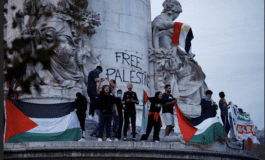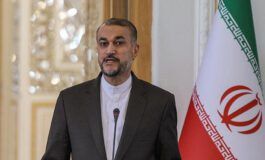
RAMALLAH (IPS) — Over a hundred Fatah fighters loyal to Palestinian President Mahmoud Abbas’s Fatah movement fled to the West Bank from Gaza last week, fearing for their lives at the hands of Hamas, the Islamic movement which took over the Gaza Strip in June 2007 after it routed Fatah forces.
The Fatah men barely managed to escape the violence which broke out in the Sajaiyeh neighborhood of Gaza City, leaving nearly a dozen Palestinians dead and over a hundred injured, including women and children.
Following several bomb explosions in Gaza city, which left five Hamas members and a young Palestinian girl dead, Hamas raided a heavily militarized stronghold belonging to one of the most powerful clans in Gaza, the Hilles, after accusing them of being behind the explosions.
The Hilles clan is loyal to Fatah, the military wing associated with Abbas’s Palestinian National Authority (PNA).
During the raid the Hilles fought the invading forces with a large military cache at their disposal, including Kalashnikovs and rockets, in addition to booby-trapping the entrances to their homes with explosives and placing snipers on the roofs.
While to most Western observers the political infighting between Hamas and the PNA is merely a political power struggle, it is in fact far more complex than this.
Power struggles within the two organizations as different factions jockey for position, switching loyalties based on political expediency, and powerful clan struggles revolving around extortion and business racketeering as clan chieftains fight to retain their turf are all part of the murky political underworld in the Palestinian territories.
“To the international supporters and the financial backers of Abbas, or Abu Mazen as he is better known, he is the good guy due to his moderation while Hamas are considered the bad guys because of being ‘Islamic fundamentalists’,” Moshe Ma’oz, professor emeritus of Islamic and Middle Eastern Studies at Jerusalem’s Hebrew University, and Senior Fellow at The Harry S. Truman Research Institute for the Advancement of Peace, told IPS.
This has led to the international community, and Israel in particular, turning a blind eye to the cronyism, corruption and human rights abuses committed by the PNA, while at the same time heavily censoring Hamas for any misdeed.
“However, the behavior of the PNA is not lost on the Palestinian population as the PNA continues to lose support. The PNA leadership is worried about Hamas taking over in the West Bank,” said Mo’az.
Many Palestinians also believe that the PNA, in addition to being corrupt, has compromised too much with Israel in return for receiving too little as Israel continues to build illegal settlements on Palestinian land, and expropriate the majority of the West Bank’s water resources, contrary to international law.
A poll carried out in May by the Arab World for Research and Development (AWRAD), based in Ramallah in the central West Bank, showed that the number of Palestinians who approved of the performance of PNA Prime Minister Salam Fayyad’s cabinet, had slumped significantly, while those disapproving of the cabinet’s performance had risen dramatically.
Hamas’s approval ratings on the other hand, under the leadership of de facto Prime Minister Ismail Haniyeh, have remained steady in Gaza while rising in the West Bank.
“To a large degree Hamas has managed to establish law and order on the streets of Gaza and kidnappings have ceased,” Mo’az told IPS. “They are regarded as clean politically, not corrupt like Fatah.”
This poll, however, was taken before the latest outbreak of violence which saw Abbas pleading with the Israelis to allow the fleeing members of the Hilles clan to cross through the heavily fortified and militarized Erez border crossing from Gaza into Israel.
The men were stripped to their underwear, searched and interrogated by the Israelis before being brought into custody. This humiliation was captured by the international media and splashed across the pages of newspapers and TV screens across the world.
Abbas was then allegedly pressured by former Fatah strongman, Muhammed Dahlan, a favorite of the Israelis and of the U.S., who fled Gaza during the coup, not to let them in. Some were sent back to Gaza where they were promptly arrested by Hamas.
However, Abbas then back-flipped yet again and asked Israel to allow them in. Some were subsequently sent to Jericho near the Dead Sea after the PNA made it clear they were not welcome in Ramallah.
Hamas alleges that Dahlan, and a small corrupt Fatah faction, planned to overthrow Hamas’s democratically elected leadership, using arms and financial backing they had received from the CIA and Israel.
Further muddying the political waters are the myriad of powerful clans in Gaza who under the previous PNA leadership became both powerful and rich as they cornered specific business and black markets. In return they swore allegiance to the PNA.
The notorious Dugmush clan, who were responsible for the kidnapping of BBC reporter Alan Johnston, grew wealthy by trading in black market cigarettes and cement.
Under the guise of Islamic piety as a cover for their criminal activities, and purportedly operating for al-Qaeda, the Dugmushes and a number of other new fanatical Islamic organizations do not take kindly to being challenged.
They have repeatedly sought to embarrass the Hamas leadership by bombing beauty salons, Internet cafes and other establishments associated with Western “decadence.”
So, the Islamic resistance group’s leadership was well aware that challenging the more powerful clans, such as the Hilles, would result in bloodshed. But following the brazen bomb attacks in Gaza city, Hamas could no longer turn a blind eye.
However, despite the multi-faceted dimensions of the conflict, neither Hamas nor Fatah seem overly keen to attempt to bridge their political differences. It would, furthermore, appear that the possibility of a Palestinian state remains even more elusive under the current Palestinian leadership — or some would argue lack of leadership. And Israel appears happy to play the sides off against one another as the divide and conquer strategy comes into full fruition.





Leave a Reply